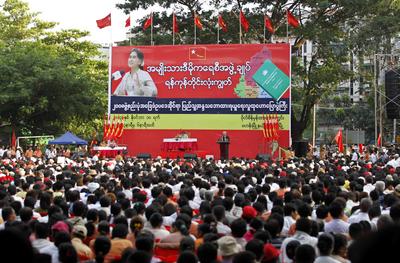The military carefully cordoned off these realms via constitutional provisions before transferring power, effectively becoming a veto player in political proceedings. As a result, many believe that the military’s removal from the political apparatus is necessary for the country’s transition towards democracy.
While much commentary has legitimately focused on these matters, another interrelated issue is whether seeking justice for abuses committed during the military junta’s reign will be a priority for any future government. Such abuses include: suppression of the Saffron Revolution; inept and perhaps deliberate inhibition of aid responses to areas hit by Cyclone Nargis; and multiple rights abuses, such as land seizures in the ethnic borderlands, to name a few. But the military’s rights abuse record continues even in the transition era, as a recent Women’s League of Burma report attests to — documenting 100 cases of rape by the military since 2011.
Although the opposition party, the National League for Democracy, will most likely win the 2015 elections — barring electoral manipulations — it has been largely silent on the issue of justice for good reason. While defeating the governing Union of Solidarity and Development Party would remove the military-supported regime, it is likely the military itself will remain a powerful political actor whose cooperation will be needed in the effective running of the state.
It is doubtful that Myanmar can transition away from authoritarianism towards democracy without the military itself undergoing significant change. In particular, a complete reconfiguration of civilian–military relations is required. This would include the development of civilian expertise and presence within security portfolios; parliamentary oversight of the military; the transformation of the Tatmadaw into a professional service; and their eventual removal from all levers of state power. These endeavours would necessitate changes in responsibilities and duties between civilians and the military. The changes would also ideally stem from a deeper normative shift in relations in terms of legitimacy and authority.
But within such a project where does the pursuit of justice fit in — if at all? Is justice a prerequisite for the entrenchment of democracy, or an undertaking that should be pursued once democracy is firmly established? Could such moves alienate the military and other power holders undermining the reform process on the whole?
The proliferation of actors in the political landscape who have different identities and sources of legitimacy has eroded earlier (and simpler) characterisations. Those characterisations included reformers and democrats on one side, and the military and their surrogate regime, led by former officers, on the other. In particular, officers turned politicians, such as President Sein and Speaker Chairman Shwe Mann, have created new identities and new loci of power and support that distance themselves from the military — without coming into open conflict. The divide between the military-as-institution and the (former) military-as-government shows how power has been dispersed among numerous actors, which were originally viewed as a monolithic entity, opening avenues for new identities, interests and relationships to emerge.
But attempts to bring former junta members to account would implicate many within the government and the military. They would most likely bind together in an attempt to avoid prosecution, erasing the growing divergence amongst them. Reformist elements within these organisations may then be sidelined as a more obstructionist position is assumed against civilian politicians. A significant obstacle is that members of the previous military regime are immune from legal actions as guaranteed in the Constitution (Article 445); and constitutional amendments will require military consent.
With this in mind, it is very likely that Myanmar in the future will establish some form of truth and reconciliation commission, as many states have done after emerging from authoritarian rule. Acknowledging the unique factors within Myanmar’s past and current transition, much can be learned from historical examples, including Chile, Argentina and South Africa. The South African case is particularly intriguing as many applauded the focus that was more on reconciliation than criminal prosecution (with many Apartheid members granted amnesty) because it ensured the process did not inflame racial divides. But some criticised the focus, arguing justice is a precondition and not an alternative to reconciliation. Given the power of Myanmar’s military and the permeation of retired officers into government and business, perhaps the South African case could be a blueprint for how to pursue these matters without disrupting the overall reform process.
Seeking justice is an important issue. But continued support for incremental change would most likely overrule such desires in the short to medium term. The eventual task of approaching the sensitive subject of the military’s political role and legacy will have to be managed in such a way as to create strong and cooperative relations with the military. In particular, it must be emphasised that — if any legal proceedings or tribunals occur — the aim is not about punishing the military as an institution. Rather, the aim is to support a transformative process to change the military internally into a professional service that can build new external relations with the political apparatus and society as a whole.
This may not be satisfactory to many, but within the contemporary political balance-of-power reformers must walk a careful line. They must promote gradual change while at the same time not drawing hostility from those who still hold significant power in Myanmar — reform and justice must be balanced to keep the system functioning.
Adam P. MacDonald is an independent researcher based in Halifax, Canada.
This article appeared in the most recent edition of the East Asia Forum Quarterly,‘On the edge in Asia’.

